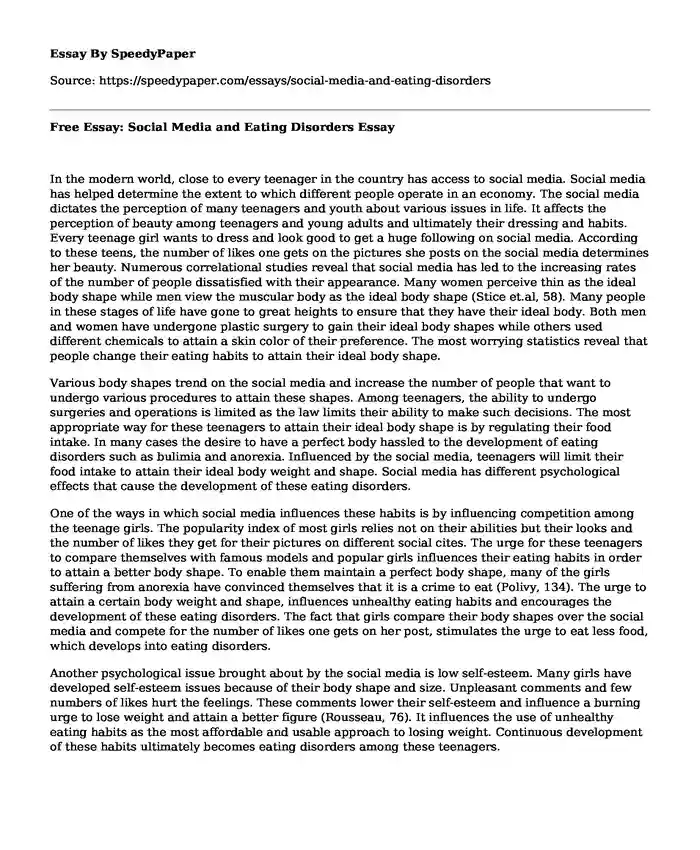
| Type of paper: | Essay |
| Categories: | Pressure Mental health Social media Disorder |
| Pages: | 3 |
| Wordcount: | 762 words |
In the modern world, close to every teenager in the country has access to social media. Social media has helped determine the extent to which different people operate in an economy. The social media dictates the perception of many teenagers and youth about various issues in life. It affects the perception of beauty among teenagers and young adults and ultimately their dressing and habits. Every teenage girl wants to dress and look good to get a huge following on social media. According to these teens, the number of likes one gets on the pictures she posts on the social media determines her beauty. Numerous correlational studies reveal that social media has led to the increasing rates of the number of people dissatisfied with their appearance. Many women perceive thin as the ideal body shape while men view the muscular body as the ideal body shape (Stice et.al, 58). Many people in these stages of life have gone to great heights to ensure that they have their ideal body. Both men and women have undergone plastic surgery to gain their ideal body shapes while others used different chemicals to attain a skin color of their preference. The most worrying statistics reveal that people change their eating habits to attain their ideal body shape.
Various body shapes trend on the social media and increase the number of people that want to undergo various procedures to attain these shapes. Among teenagers, the ability to undergo surgeries and operations is limited as the law limits their ability to make such decisions. The most appropriate way for these teenagers to attain their ideal body shape is by regulating their food intake. In many cases the desire to have a perfect body hassled to the development of eating disorders such as bulimia and anorexia. Influenced by the social media, teenagers will limit their food intake to attain their ideal body weight and shape. Social media has different psychological effects that cause the development of these eating disorders.
One of the ways in which social media influences these habits is by influencing competition among the teenage girls. The popularity index of most girls relies not on their abilities but their looks and the number of likes they get for their pictures on different social cites. The urge for these teenagers to compare themselves with famous models and popular girls influences their eating habits in order to attain a better body shape. To enable them maintain a perfect body shape, many of the girls suffering from anorexia have convinced themselves that it is a crime to eat (Polivy, 134). The urge to attain a certain body weight and shape, influences unhealthy eating habits and encourages the development of these eating disorders. The fact that girls compare their body shapes over the social media and compete for the number of likes one gets on her post, stimulates the urge to eat less food, which develops into eating disorders.
Another psychological issue brought about by the social media is low self-esteem. Many girls have developed self-esteem issues because of their body shape and size. Unpleasant comments and few numbers of likes hurt the feelings. These comments lower their self-esteem and influence a burning urge to lose weight and attain a better figure (Rousseau, 76). It influences the use of unhealthy eating habits as the most affordable and usable approach to losing weight. Continuous development of these habits ultimately becomes eating disorders among these teenagers.
Works Cited
Acton, Q A. Issues in Addiction and Eating Disorders. N.p., 2012. Print.
Agras, W S. The Oxford Handbook of Eating Disorders. Oxford: Oxford UP, 2010. Print.
Claes, Laurence, and Jennifer J. Muehlenkamp. Non-suicidal Self-Injury in Eating Disorders: Advancements in Etiology and Treatment. N.p., 2014. Print.
Karin, Eli, and Stanley J. Ulijaszek. Obesity, Eating Disorders and the Media. N.p., 2014. Print.
Loeb, Katharine L, Grange D. Le, and James Lock. Family Therapy for Adolescent Eating and Weight Disorders: New Applications. N.p., 2015. Print.
Polivy, Janet, and C. P. Herman. "Sociocultural Idealization of Thin Female Body Shapes: An Introduction to the Special Issue on Body Image and Eating Disorders." Journal of Social and Clinical Psychology (2004): n. pag. Print.
Rousseau, Signe. Food and Social Media: You Are What You Tweet. Lanham: Altamira Press/Rowman & Littlefield, 2012. Print.
Shally-Jensen, Michael. Mental Health Care Issues in America: An Encyclopedia. Santa Barbara: ABC-CLIO, 2013. Print.
Stice, Eric, Erika Schupak-Neuberg, Heather E. Shaw, and Richard I. Stein. "Relation of Media Exposure to Eating Disorder Symptomatology: An Examination of Mediating Mechanisms." Journal of Abnormal Psychology (1994): n. pag. Print.
Wagner, Viqi. Eating Disorders. Detroit: Greenhaven Press, 2007. Print.
Cite this page
Free Essay: Social Media and Eating Disorders. (2020, Aug 13). Retrieved from https://speedypaper.com/essays/social-media-and-eating-disorders
Request Removal
If you are the original author of this essay and no longer wish to have it published on the SpeedyPaper website, please click below to request its removal:
- Marketing Essay Sample on Customer Lifetime Value
- The Avengers - Free Essay on the Movie
- Free Essay with Leaching System Plans
- Essay Example on Groups of Pharmacological Treatments
- Essay Example on Emotions in Animals and Human Beings
- Significance of the Theme of Social Structure in "Antigone." Paper Example
- Exploring the Impact of Policy Restrictions on Advanced Practice Registered Nurse Care: Research Paper
Popular categories




